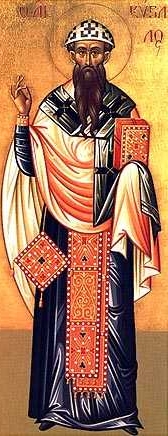Cyril of Alexandria
Appearance

Saint Cyril of Alexandria (in Ancient Greek: Κύριλλος Ἀλεξανδρείας ; ca 376 – 444) was the Patriarch of Alexandra from 412 to 44.[1] He was enthroned when the city was at the height of its influence and power within the Roman Empire. Cyril wrote extensively and was a major player in the Christological controversies of the late-4th and 5th centuries. He was a central figure in the Council of Ephesus in 431, which led to the deposition of Nestorius as Patriarch of Constantinople. Cyril is counted among the Church Fathers and also as a Doctor of the Church, and his reputation within the Christian world has resulted in his titles Pillar of Faith and Seal of all the Fathers.
Quotes
[edit]- For the faith of Christ we are ready to suffer everything: chains, prison, all the inconveniences of life and death itself.
- Noi per la fede di Cristo siamo pronti a subire tutto: le catene, il carcere, tutti gli incomodi della vita e la stessa morte.
- As quoted in Enrico Pepe, Martiri e santi del calendario romano (in Italian)
- Noi per la fede di Cristo siamo pronti a subire tutto: le catene, il carcere, tutti gli incomodi della vita e la stessa morte.
- Since Christ Himself said in reference to the bread: "This is My Body," who will dare remain hesitant? And since with equal clarity He asserted: "This is My Blood," who will dare entertain any doubt and say that this is not His Blood?... You have been taught these truths. Imbued with the certainty of faith, you know that what seems to be bread is not bread but the Body of Christ, although it seems to be bread when tasted. You also know that what seems to be wine is not wine but the Blood of Christ although it does taste like wine.
- From a catechetical instruction given by Saint Cyril of Jerusalem for his successor John in the 4th century. As quoted in Missionaries of the Blessed Sacrament-Eucharistic quotes
- That anyone could doubt the right of the holy Virgin to be called the Mother of God fills me with astonishment. Surely she must be the Mother of God if our Lord Jesus Christ is God, and she gave birth to him! Our Lord’s disciples may not have used those exact words, but they delivered to us the belief those words enshrine, and this has also been taught us by the holy fathers.
- As quoted in 5 Inspiring quotes from St. Cyril of Alexandria (June 27, 2017)
- We affirm that the natures are different that are united in one true unity, but from both has come only one Christ and Son; not because, due to their unity, the difference in their natures has been eliminated, but rather, because divinity and humanity, reunited in an ineffable and indescribable union, have produced for us one Lord and Christ and Son. We will profess only one Christ and Lord, not in the sense that we worship the man together with the Logos, in order not to suggest the idea of separation by saying "together', but in the sense that we worship only one and the same, because he is not extraneous to the Logos, his body, with which he also sits at his Father's side, not as if "two sons" are sitting beside him but only one, united with his own flesh.
- As quoted in General Audience of 3 October 2007
References
[edit]- ↑ Chisholm, Hugh, ed. (1911). "Cyril (bishop of Alexandria)". Encyclopædia Britannica. 7. (11th ed.). Cambridge University Press. p. 706.
| This article is a stub. You can help out with Wikiquote by expanding it! |

